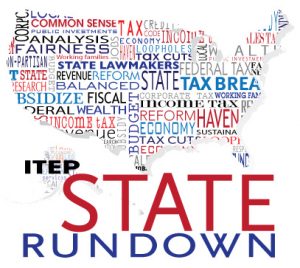 This week in state tax news we saw a destructive tax cut effort defeated in Georgia, a state shutdown avoided in New York, and lawmakers hone in on major tax debates in Massachusetts, Nebraska, South Carolina, and WestVirginia. State efforts to collect taxes owed on online purchases continue to heat up as well.
This week in state tax news we saw a destructive tax cut effort defeated in Georgia, a state shutdown avoided in New York, and lawmakers hone in on major tax debates in Massachusetts, Nebraska, South Carolina, and WestVirginia. State efforts to collect taxes owed on online purchases continue to heat up as well.
— Meg Wiehe, ITEP State Policy Director, @megwiehe
- Georgia‘s 2017 session ended last week without legislators passing a major income tax cut that had been working its way through the legislature. The bill could be revived next year, however.
- In their final week of regular session, the West Virginia House throws a new tax reform proposal into the mix. The latest version under consideration would keep the personal income tax as is, broaden the sales tax base (but not include groceries), and lower the sales tax rate to 4.75 percent by 2020.
- In Massachusetts, a measure to decrease the state sales tax rate could join the millionaire’s tax, a 4 percent surcharge on incomes over $1 million, on the ballot. The result would be a proposal close to revenue neutral rather than a way to bolster revenue for education and transportation spending.
- A protracted fight over tax cuts may move from Nebraska‘s Revenue Committee to the full legislature soon. One piece of a compromise, a bill to cancel a $224 million property tax credit and use the money for more targeted school aid has now advanced. If the committee also advances an separate bill that makes further property tax changes as well as massive income tax cuts for high-income Nebraskans, the full legislature will take up the bills. The legislative session is now about two-thirds complete, ending in June.
- South Carolina‘s needed gas tax update faces a difficult road ahead. Senators blocked the bill from being debated last week so they could combine it with income tax cuts that will drain funding from other state priorities like education and health care, and new Gov. McMaster has now vowed to veto any gas tax increase, preferring instead to borrow $1 billion for roads repairs.
- Avoiding a shutdown, New York lawmakers extended the terms of the state’s current budget. The reasoning is due in part to uncertainty at the federal level. Tax policy changes, such as the proposed extension of the state’s millionaires tax, will be debated over the next two months.
- In Oklahoma, a group of oil and gas producers have asked lawmakers to raise the state’s gross production tax. Demonstrating their commitment to helping solve the state’s budget woes, they would like to see the tax return to 7 percent.
- District of Columbia Mayor Bowser and the D.C. Council appear unlikely to roll back scheduled tax cuts despite pressure from the community to devote the revenue to local needs instead.
- Internet sales tax bills are facing various fates in the states this legislative session. Efforts are underway in Colorado to limit the law that many states have modeled their proposals on—taking away the provision that requires businesses to report buyers who owe state taxes that the retailer didn’t collect. A bill to require the collection of sales taxes from online transactions in New Mexico passed both chambers and faces its end if Governor Martinez fails to act in the coming days. Stop and go efforts in Arkansas ended without passage of an online sales tax bill as the legislature recessed until veto session. A Kansas bill patterned off of the Colorado law has received a first round of approval in the House.
Governors’ State of the State Addresses
- Gov. Kasich of Ohio gave his address on April 4, in which he repeated debunked tax-cut mythology, saying “look at the states across this country that have the fastest economic growth. They either have no income tax or very low income taxes.”
What We’re Reading…
- The Center on Budget and Policy Priorities (CBPP) released a report last week that presents steps states can take to strengthen their tax systems and reserves in the face of revenue shortfalls.
- Governing unpacks where and why personal income is growing and shrinking in different states.
- In a recent video, Pennsylvania Budget and Policy Center’s Director, Marc Stier, presents the group’s Fair Share Tax Plan.
If you like what you are seeing in the Rundown (or even if you don’t) please send any feedback or tips for future posts to Meg Wiehe at [email protected]. Click here to sign up to receive the Rundown via email.





